
tank-royale
Git repository for Robocode Tank Royale
Stars: 238
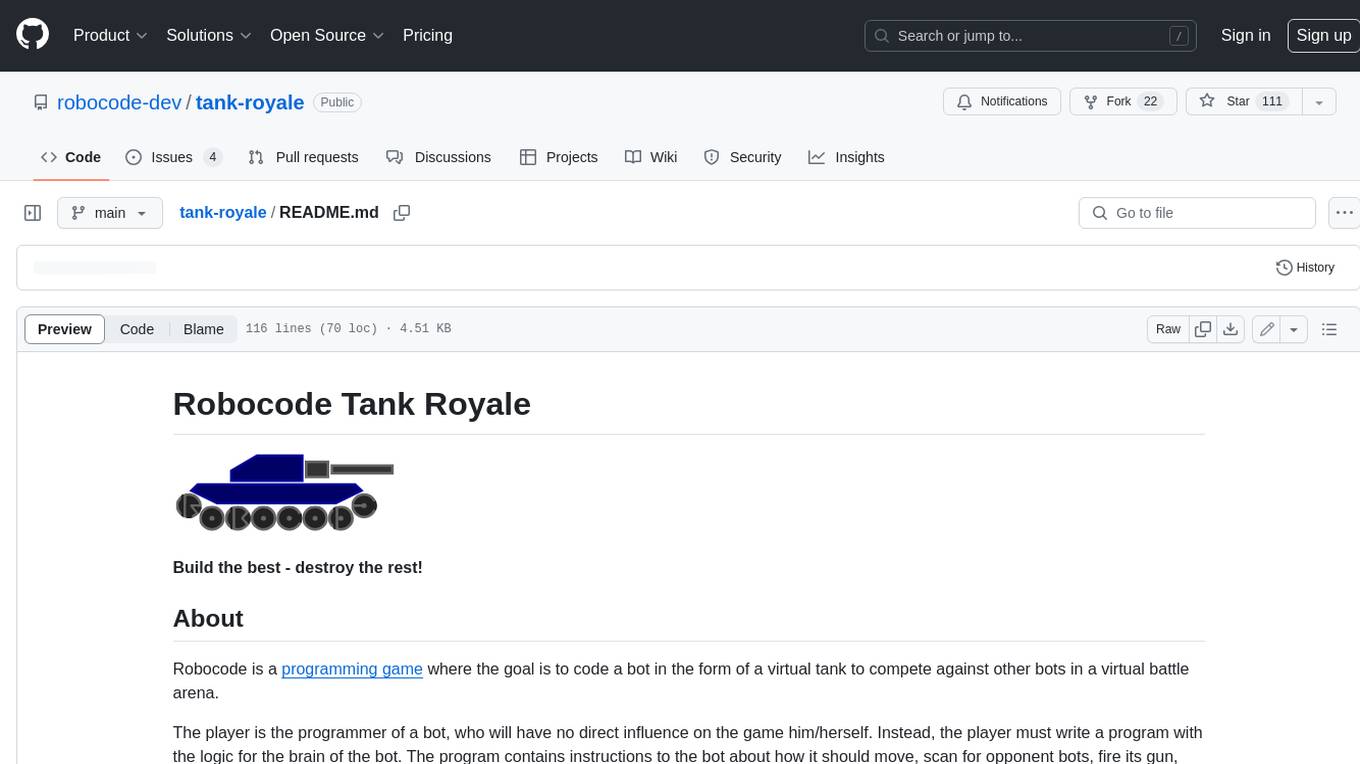
Robocode Tank Royale is a programming game where the goal is to code a bot in the form of a virtual tank to compete against other bots in a virtual battle arena. The player is the programmer of a bot, who will have no direct influence on the game him/herself. Instead, the player must write a program with the logic for the brain of the bot. The program contains instructions to the bot about how it should move, scan for opponent bots, fire its gun, and how it should react to various events occurring during a battle. The name **Robocode** is short for "Robot code," which originates from the original/first version of the game. **Robocode Tank Royale** is the next evolution/version of the game, where bots can participate via the Internet/network. All bots run over a web socket. The game aims to help you learn how to program and improve your programming skills, and have fun while doing it. Robocode is also useful when studying or improving machine learning in a fast-running real-time game. Robocode's battles take place on a "battlefield," where bots fight it out until only one is left, like a Battle Royale game. Hence the name **Tank Royale**. Note that Robocode contains no gore, blood, people, and politics. The battles are simply for the excitement of the competition we appreciate so much.
README:
Build the best – destroy the rest!
Robocode is a programming game where the goal is to code a bot in the form of a virtual tank that competes against other bots in a virtual battle arena.
The player writes a program that controls the bot’s movement, scanning, firing, and reactions to events during a battle. All logic lives inside this program – you never control the bot directly.
The name Robocode is short for “Robot code” and comes from the original version
here.
Robocode Tank Royale is the next evolution, where bots can play over the Internet via WebSocket.
This project aims to help you learn programming, improve AI skills in a fast‑running real‑time game, and have fun while competing.
Want to visualize battles in style? Check out the Tank Royale Viewer—a beautiful web-based viewer for watching Robocode Tank Royale matches in real-time! Created by Jan Durovec, this tool is perfect for displaying live battles on big monitors during competitions, analyzing recorded battles, and showcasing championship matches.
Main page:
Robocode Tank Royale Docs
The Book of Robocode 📖 is a comprehensive guide covering Robocode as well as Robocode Tank Royale—from basics to advanced strategies like wave surfing, guess-factor targeting, and movement techniques. It builds on two decades of community knowledge and foundational research from RoboWiki contributors.
If you are new to Robocode or just need a refresher, start with the
Getting Started guide.
For hands‑on coding, continue to the
My First Bot tutorial.
The Installation guide covers how to install the GUI, and includes sample bots for quick demos.
Robocode runs on Java 11 or newer and supports Windows, macOS, and Linux out of the box.
Bot APIs are available for:
- Python
- Java (JVM)
- .NET
Bots can be written in any language that can access a WebSocket API and follows the protocol.
The following Bot APIs provide full client implementations:
| Language | API |
|---|---|
| Python | Python Bot API |
| Java (JVM) | Java/JVM Bot API |
| .NET | .NET Bot API |
Additional languages supported by the Java/JVM API:
- Java
- Groovy
- Kotlin
- Scala
- Jython
- Clojure
Supported .NET languages:
- C#
- F#
- Visual Basic
- IronPython
-
Bot API for WebAssembly (Wasm)
- JavaScript
- TypeScript
- Robocode API bridge for Tank Royale – see the robocode-api-bridge project.
Huge thanks to every contributor — you make this project shine! 🙌
Copyright © 2022 Flemming N. Larsen
For Tasks:
Click tags to check more tools for each tasksFor Jobs:
Alternative AI tools for tank-royale
Similar Open Source Tools

tank-royale
Robocode Tank Royale is a programming game where the goal is to code a bot in the form of a virtual tank to compete against other bots in a virtual battle arena. The player is the programmer of a bot, who will have no direct influence on the game him/herself. Instead, the player must write a program with the logic for the brain of the bot. The program contains instructions to the bot about how it should move, scan for opponent bots, fire its gun, and how it should react to various events occurring during a battle. The name **Robocode** is short for "Robot code," which originates from the original/first version of the game. **Robocode Tank Royale** is the next evolution/version of the game, where bots can participate via the Internet/network. All bots run over a web socket. The game aims to help you learn how to program and improve your programming skills, and have fun while doing it. Robocode is also useful when studying or improving machine learning in a fast-running real-time game. Robocode's battles take place on a "battlefield," where bots fight it out until only one is left, like a Battle Royale game. Hence the name **Tank Royale**. Note that Robocode contains no gore, blood, people, and politics. The battles are simply for the excitement of the competition we appreciate so much.
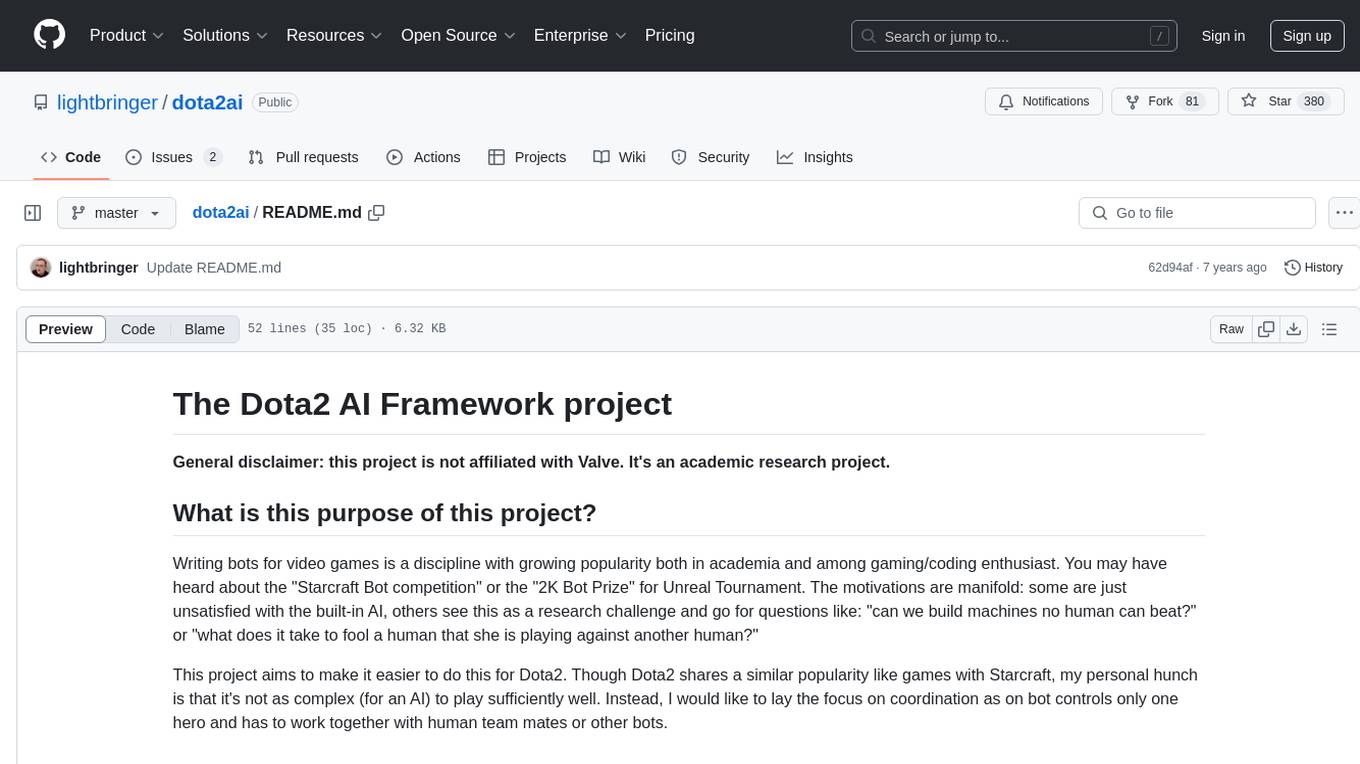
dota2ai
The Dota2 AI Framework project aims to provide a framework for creating AI bots for Dota2, focusing on coordination and teamwork. It offers a LUA sandbox for scripting, allowing developers to code bots that can compete in standard matches. The project acts as a proxy between the game and a web service through JSON objects, enabling bots to perform actions like moving, attacking, casting spells, and buying items. It encourages contributions and aims to enhance the AI capabilities in Dota2 modding.
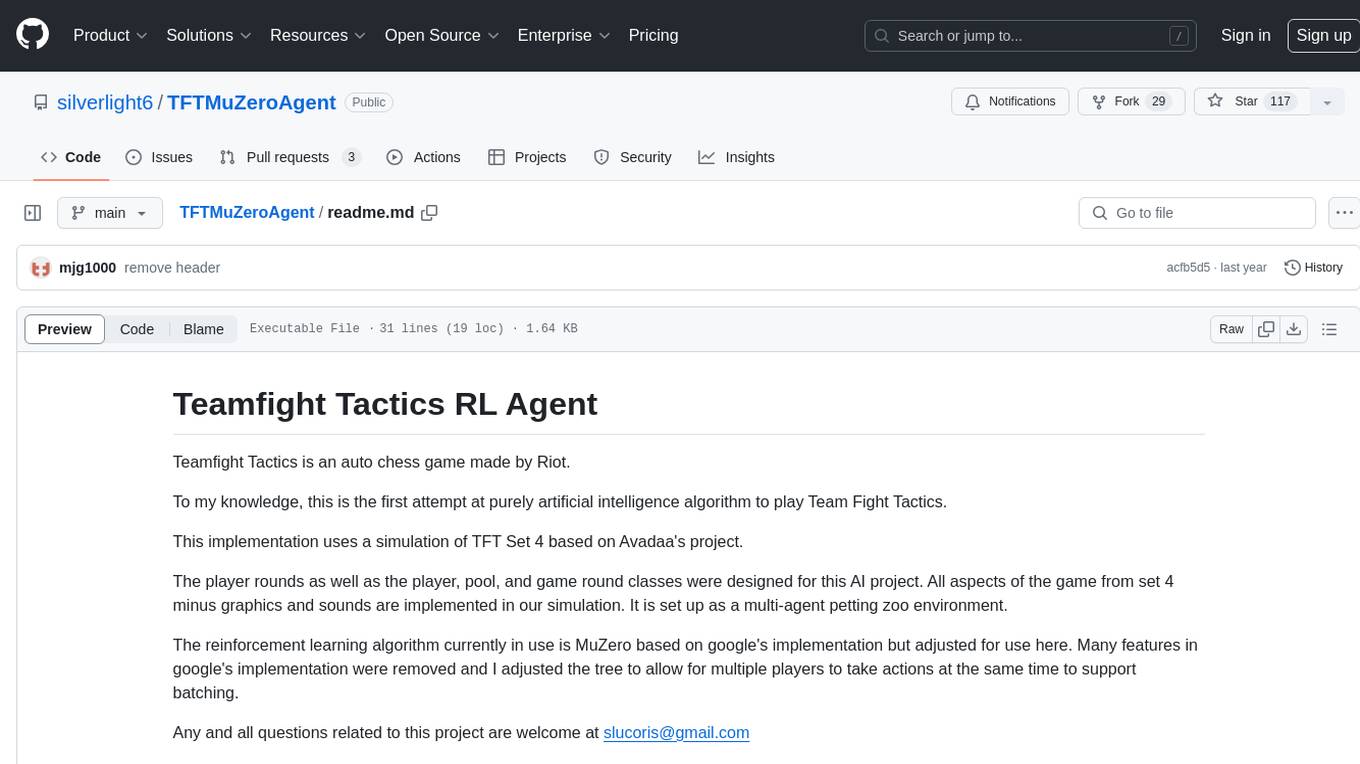
TFTMuZeroAgent
TFTMuZeroAgent is an implementation of a purely artificial intelligence algorithm to play Teamfight Tactics, an auto chess game made by Riot. It uses a simulation of TFT Set 4 and the MuZero reinforcement learning algorithm. The project provides a multi-agent petting zoo environment where players, pool, and game round classes are designed for AI project. The implementation excludes graphics and sounds but covers all aspects of the game from set 4. The codebase is open for contributions and improvements, allowing for additional models to be added to the environment.
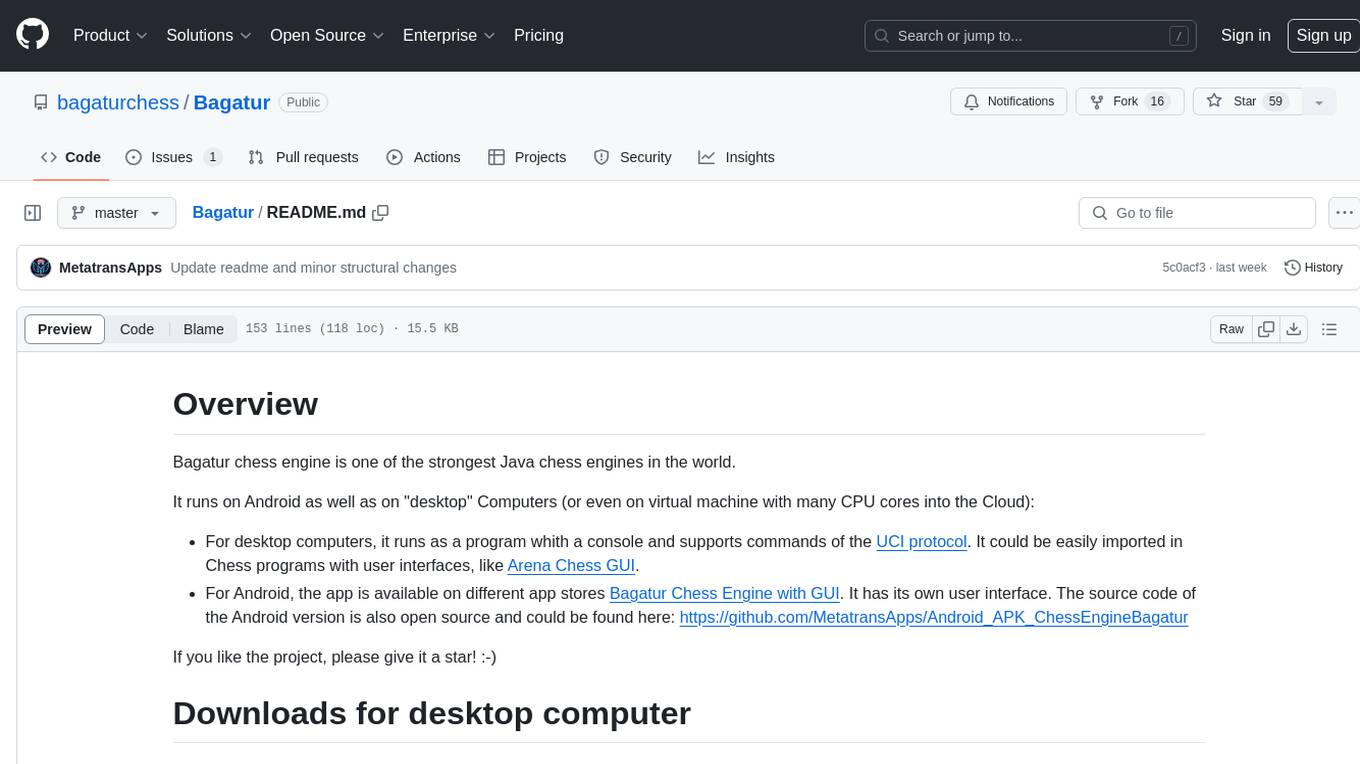
Bagatur
Bagatur chess engine is a powerful Java chess engine that can run on Android devices and desktop computers. It supports the UCI protocol and can be easily integrated into chess programs with user interfaces. The engine is available for download on various platforms and has advanced features like SMP (multicore) support and NNUE evaluation function. Bagatur also includes syzygy endgame tablebases and offers various UCI options for customization. The project started as a personal challenge to create a chess program that could defeat a friend, leading to years of development and improvements.
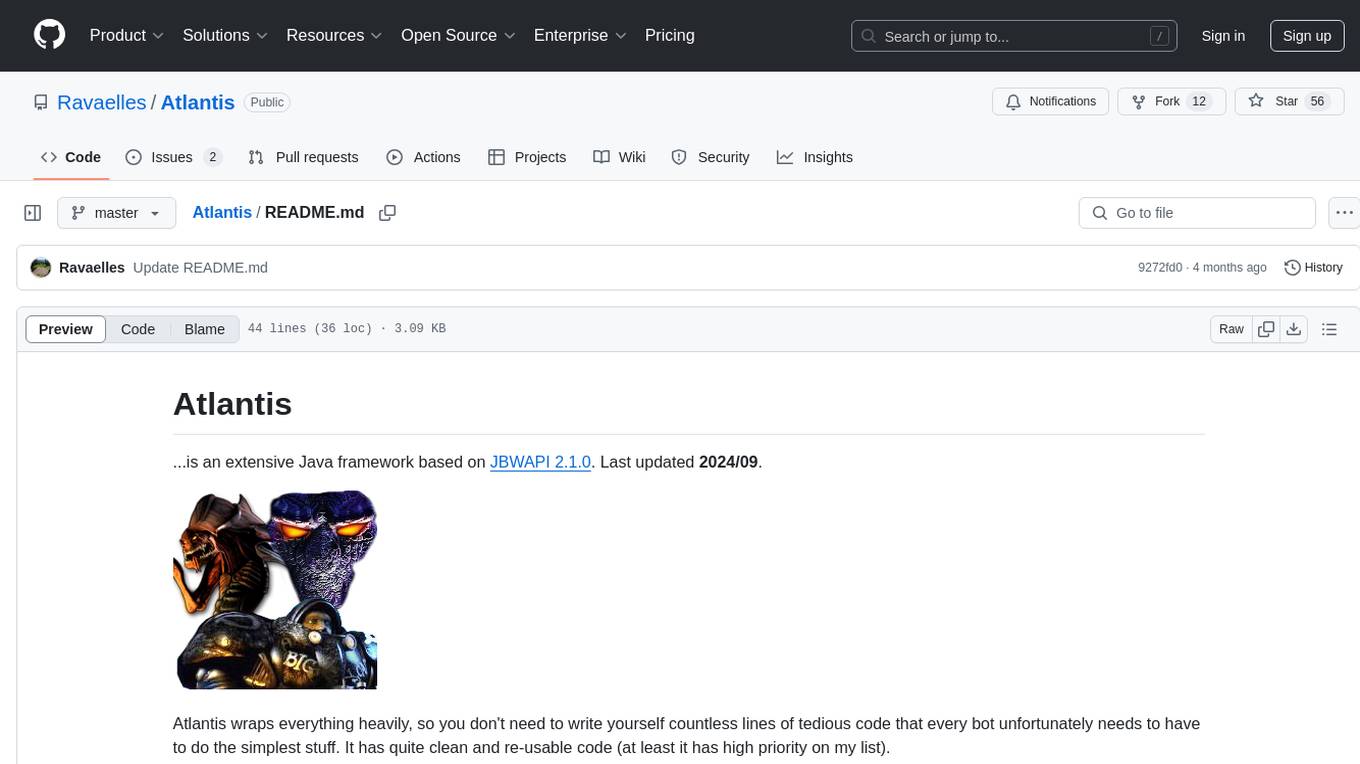
Atlantis
Atlantis is an extensive Java framework based on JBWAPI 2.1.0, designed to simplify bot development for Starcraft. It provides clean and re-usable code, supports all three races with a focus on Terran, automates various tasks like modifying bwapi.ini and managing economy, includes tests and mini-maps, offers customizable build orders, scouts enemy bases, responds to threats, and more. The framework aims to streamline bot development by handling common tasks and providing advanced features for unit selection and decision-making.
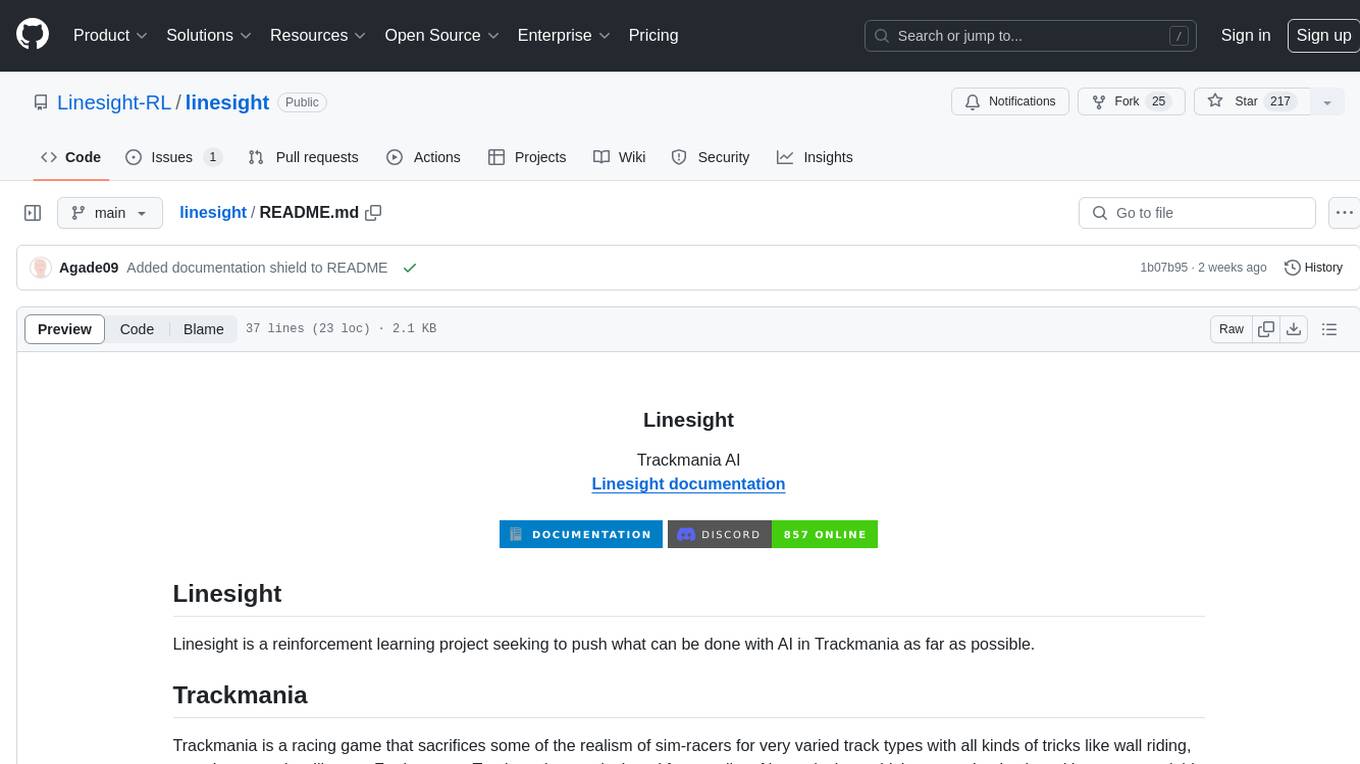
linesight
Linesight is a reinforcement learning project focused on advancing AI capabilities in the racing game Trackmania. It aims to push the boundaries of AI performance by utilizing deep learning algorithms to achieve human-level driving and beat world records on official campaign tracks. The project provides an interface to interact with Trackmania Nations Forever programmatically, enabling tasks such as sending inputs, retrieving car states, and capturing screenshots. With a strong emphasis on equality of input devices, Linesight serves as a benchmark for testing various reinforcement learning algorithms in a challenging and dynamic gaming environment.
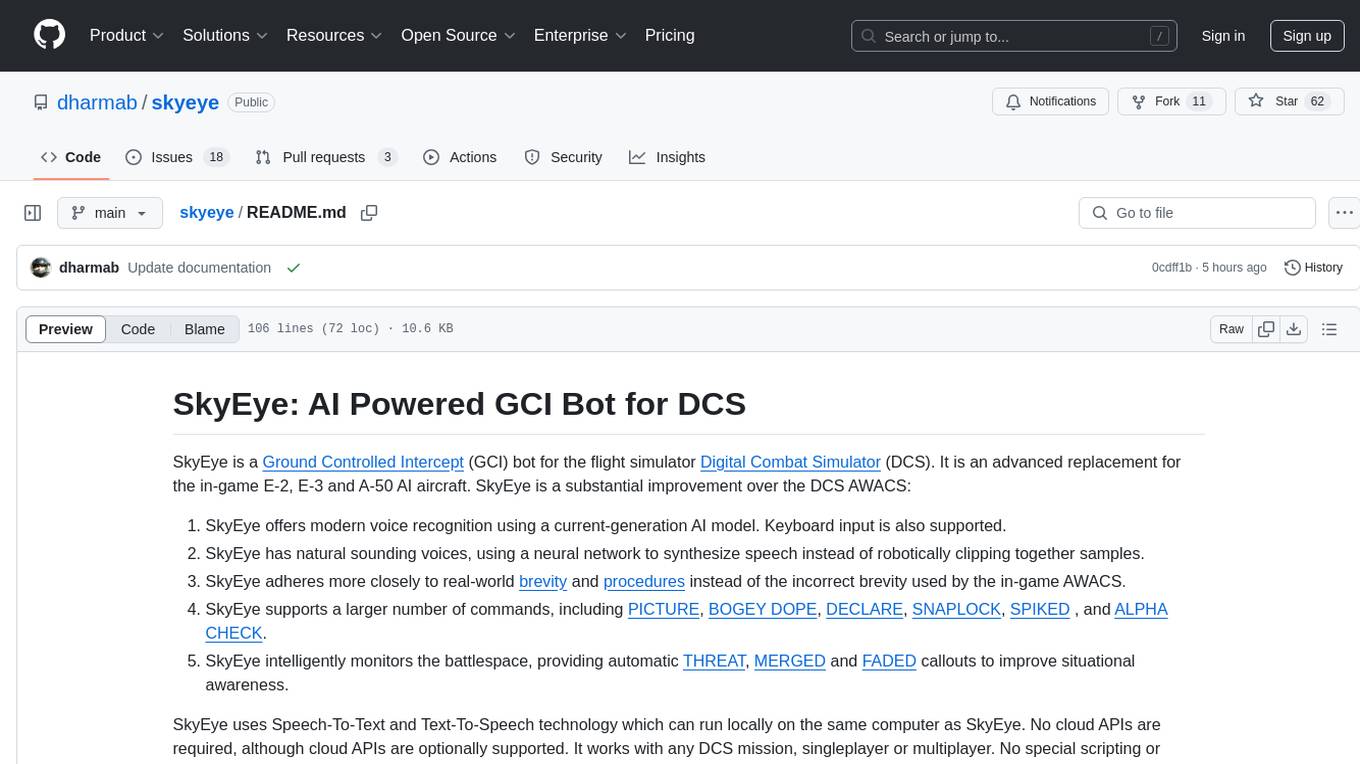
skyeye
SkyEye is an AI-powered Ground Controlled Intercept (GCI) bot designed for the flight simulator Digital Combat Simulator (DCS). It serves as an advanced replacement for the in-game E-2, E-3, and A-50 AI aircraft, offering modern voice recognition, natural-sounding voices, real-world brevity and procedures, a wide range of commands, and intelligent battlespace monitoring. The tool uses Speech-To-Text and Text-To-Speech technology, can run locally or on a cloud server, and is production-ready software used by various DCS communities.
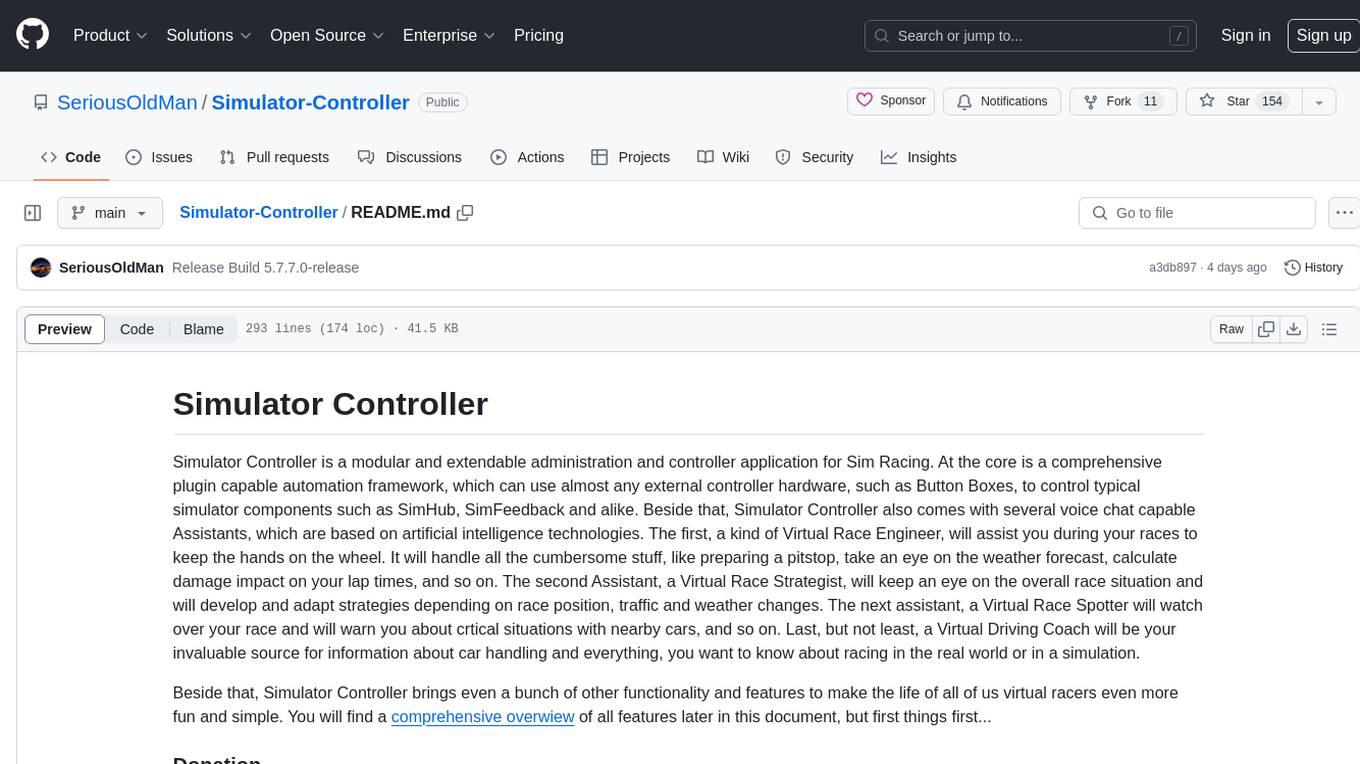
Simulator-Controller
Simulator Controller is a modular administration and controller application for Sim Racing, featuring a comprehensive plugin automation framework for external controller hardware. It includes voice chat capable Assistants like Virtual Race Engineer, Race Strategist, Race Spotter, and Driving Coach. The tool offers features for setup, strategy development, monitoring races, and more. Developed in AutoHotkey, it supports various simulation games and integrates with third-party applications for enhanced functionality.
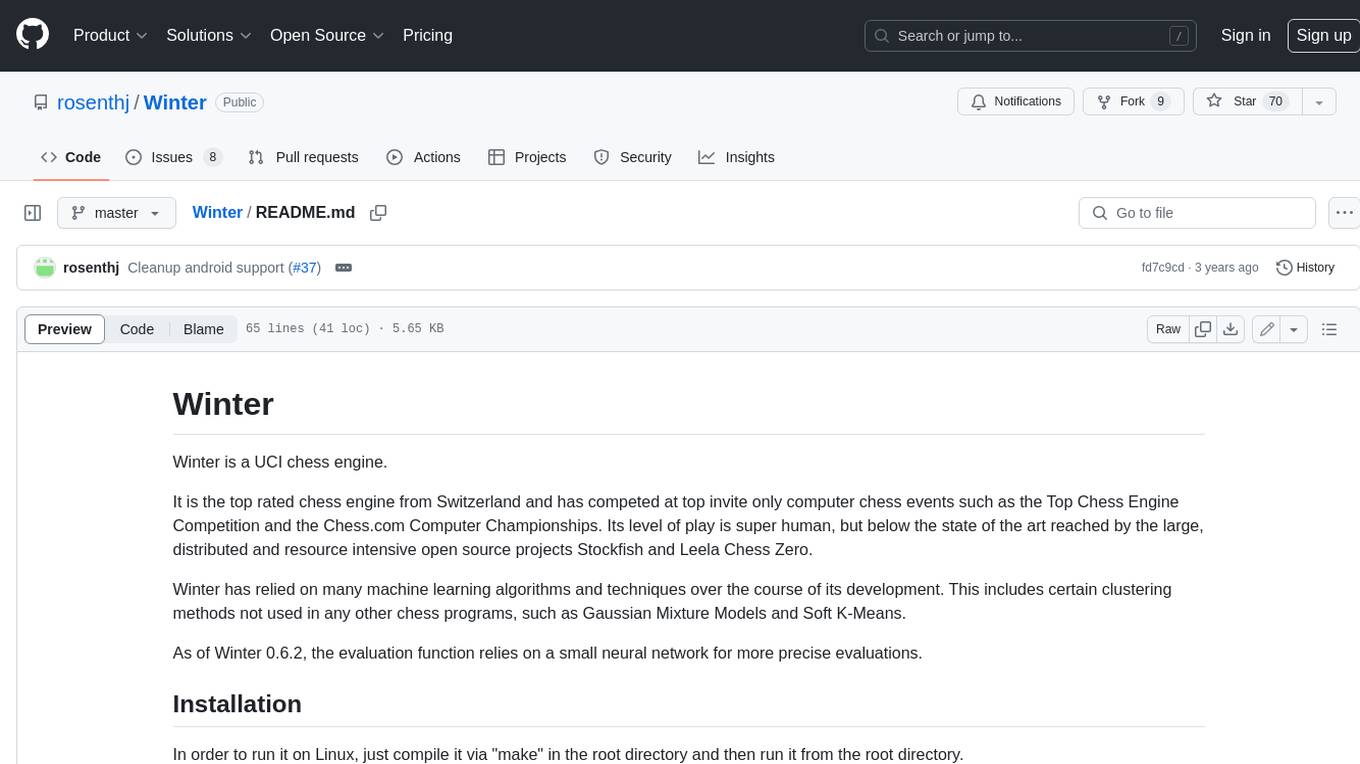
Winter
Winter is a UCI chess engine that has competed at top invite-only computer chess events. It is the top-rated chess engine from Switzerland and has a level of play that is super human but below the state of the art reached by large, distributed, and resource-intensive open-source projects like Stockfish and Leela Chess Zero. Winter has relied on many machine learning algorithms and techniques over the course of its development, including certain clustering methods not used in any other chess programs, such as Gaussian Mixture Models and Soft K-Means. As of Winter 0.6.2, the evaluation function relies on a small neural network for more precise evaluations.
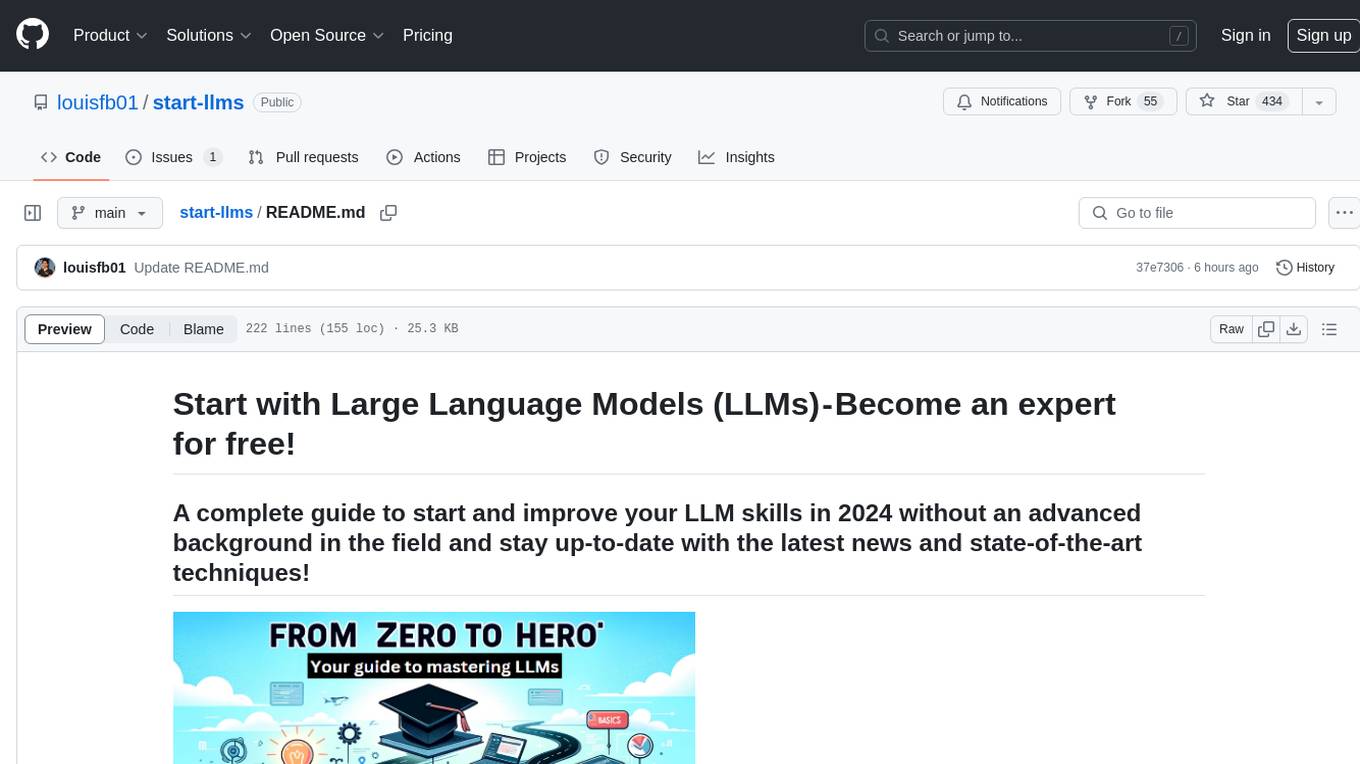
start-llms
This repository is a comprehensive guide for individuals looking to start and improve their skills in Large Language Models (LLMs) without an advanced background in the field. It provides free resources, online courses, books, articles, and practical tips to become an expert in machine learning. The guide covers topics such as terminology, transformers, prompting, retrieval augmented generation (RAG), and more. It also includes recommendations for podcasts, YouTube videos, and communities to stay updated with the latest news in AI and LLMs.
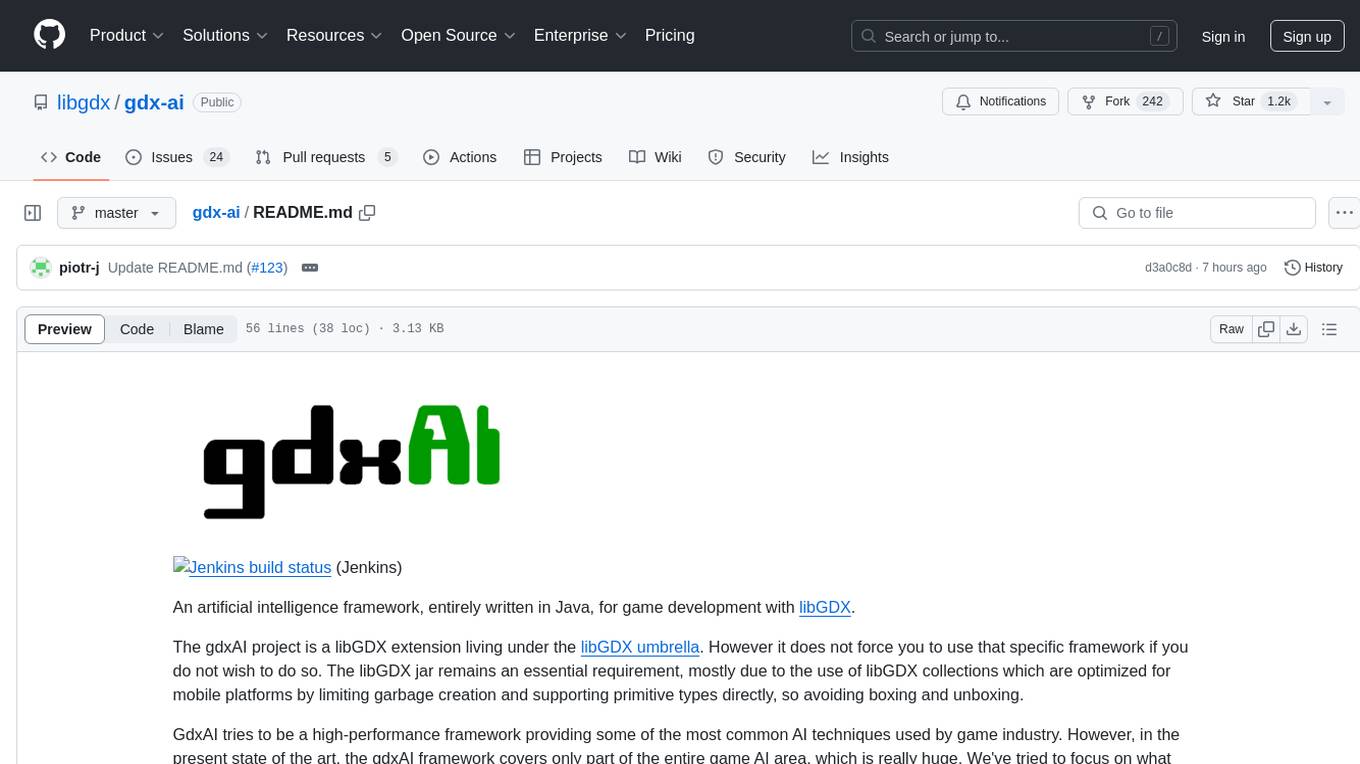
gdx-ai
An artificial intelligence framework entirely written in Java for game development with libGDX. It is a high-performance framework providing common AI techniques used in the game industry, covering movement AI, pathfinding, decision making, and infrastructure. The framework is designed to be used with libGDX but can be used independently. Current features include steering behaviors, formation motion, A* pathfinding, hierarchical pathfinding, behavior trees, state machine, message handling, and scheduling.
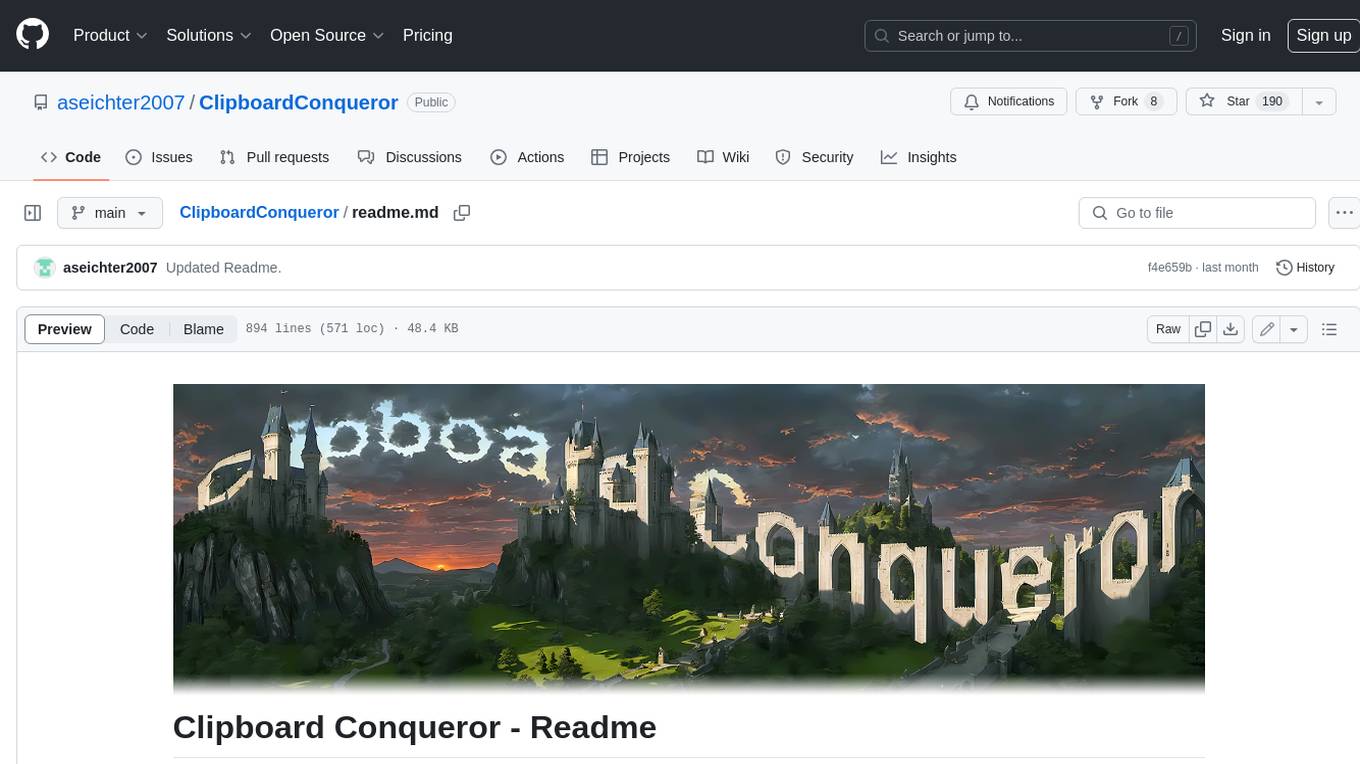
ClipboardConqueror
Clipboard Conqueror is a multi-platform omnipresent copilot alternative. Currently requiring a kobold united or openAI compatible back end, this software brings powerful LLM based tools to any text field, the universal copilot you deserve. It simply works anywhere. No need to sign in, no required key. Provided you are using local AI, CC is a data secure alternative integration provided you trust whatever backend you use. *Special thank you to the creators of KoboldAi, KoboldCPP, llamma, openAi, and the communities that made all this possible to figure out.
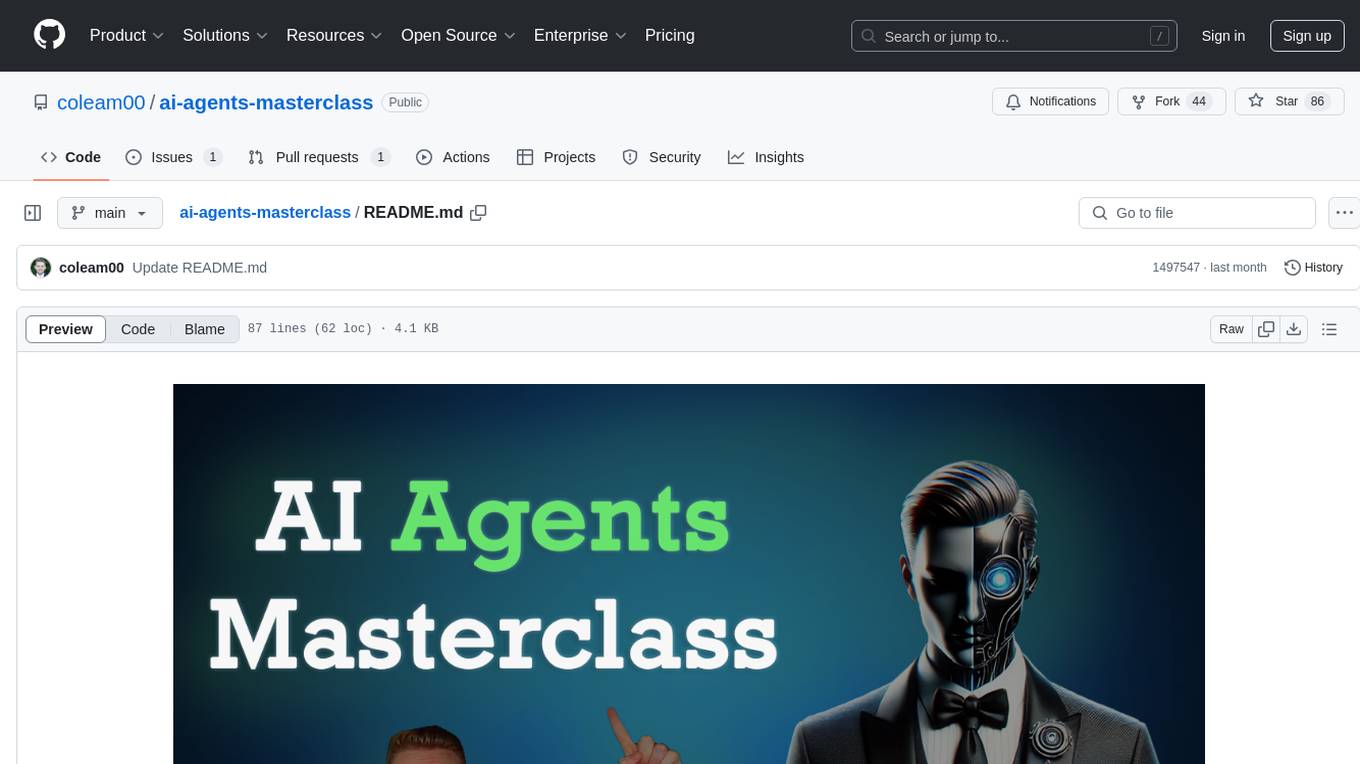
ai-agents-masterclass
AI Agents Masterclass is a repository dedicated to teaching developers how to use AI agents to transform businesses and create powerful software. It provides weekly videos with accompanying code folders, guiding users on setting up Python environments, using environment variables, and installing necessary packages to run the code. The focus is on Large Language Models that can interact with the outside world to perform tasks like drafting emails, booking appointments, and managing tasks, enabling users to create innovative applications with minimal coding effort.
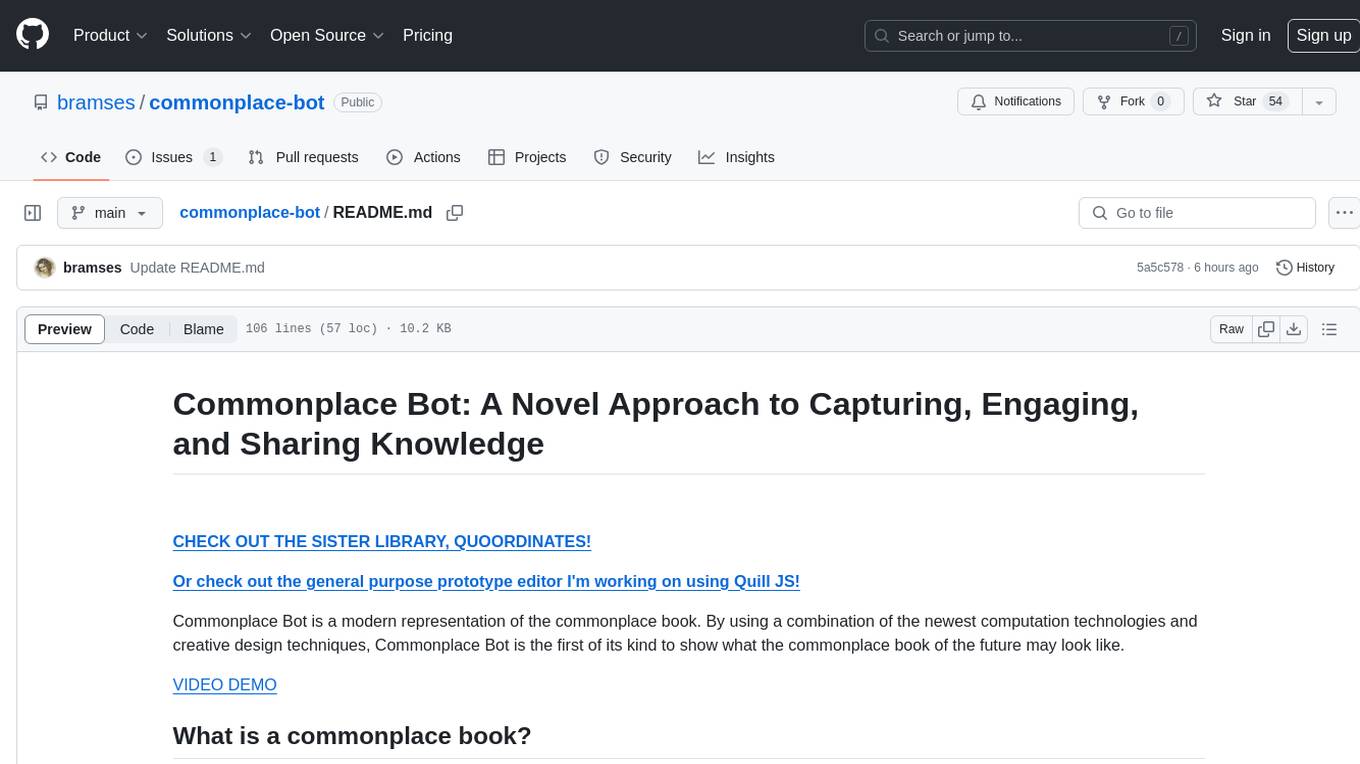
commonplace-bot
Commonplace Bot is a modern representation of the commonplace book, leveraging modern technological advancements in computation, data storage, machine learning, and networking. It aims to capture, engage, and share knowledge by providing a platform for users to collect ideas, quotes, and information, organize them efficiently, engage with the data through various strategies and triggers, and transform the data into new mediums for sharing. The tool utilizes embeddings and cached transformations for efficient data storage and retrieval, flips traditional engagement rules by engaging with the user, and enables users to alchemize raw data into new forms like art prompts. Commonplace Bot offers a unique approach to knowledge management and creative expression.
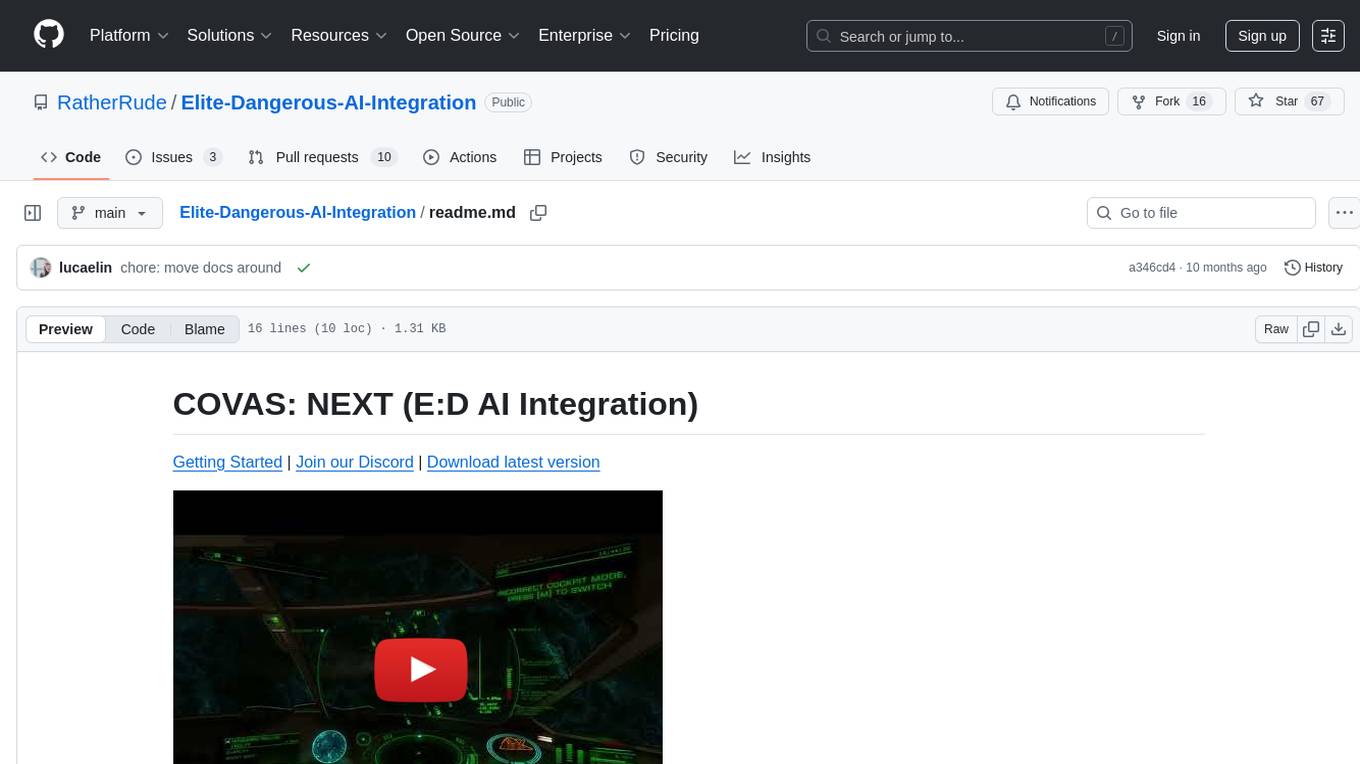
Elite-Dangerous-AI-Integration
Elite-Dangerous-AI-Integration aims to provide a seamless and efficient experience for commanders by integrating Elite:Dangerous with various services for Speech-to-Text, Text-to-Speech, and Large Language Models. The AI reacts to game events, given commands, and can perform actions like taking screenshots or fetching information from APIs. It is designed for all commanders, enhancing roleplaying, replacing third-party websites, and assisting with tutorials.

local-chat
LocalChat is a simple, easy-to-set-up, and open-source local AI chat tool that allows users to interact with generative language models on their own computers without transmitting data to a cloud server. It provides a chat-like interface for users to experience ChatGPT-like behavior locally, ensuring GDPR compliance and data privacy. Users can download LocalChat for macOS, Windows, or Linux to chat with open-weight generative language models.
For similar tasks

tank-royale
Robocode Tank Royale is a programming game where the goal is to code a bot in the form of a virtual tank to compete against other bots in a virtual battle arena. The player is the programmer of a bot, who will have no direct influence on the game him/herself. Instead, the player must write a program with the logic for the brain of the bot. The program contains instructions to the bot about how it should move, scan for opponent bots, fire its gun, and how it should react to various events occurring during a battle. The name **Robocode** is short for "Robot code," which originates from the original/first version of the game. **Robocode Tank Royale** is the next evolution/version of the game, where bots can participate via the Internet/network. All bots run over a web socket. The game aims to help you learn how to program and improve your programming skills, and have fun while doing it. Robocode is also useful when studying or improving machine learning in a fast-running real-time game. Robocode's battles take place on a "battlefield," where bots fight it out until only one is left, like a Battle Royale game. Hence the name **Tank Royale**. Note that Robocode contains no gore, blood, people, and politics. The battles are simply for the excitement of the competition we appreciate so much.
For similar jobs

weave
Weave is a toolkit for developing Generative AI applications, built by Weights & Biases. With Weave, you can log and debug language model inputs, outputs, and traces; build rigorous, apples-to-apples evaluations for language model use cases; and organize all the information generated across the LLM workflow, from experimentation to evaluations to production. Weave aims to bring rigor, best-practices, and composability to the inherently experimental process of developing Generative AI software, without introducing cognitive overhead.

agentcloud
AgentCloud is an open-source platform that enables companies to build and deploy private LLM chat apps, empowering teams to securely interact with their data. It comprises three main components: Agent Backend, Webapp, and Vector Proxy. To run this project locally, clone the repository, install Docker, and start the services. The project is licensed under the GNU Affero General Public License, version 3 only. Contributions and feedback are welcome from the community.

oss-fuzz-gen
This framework generates fuzz targets for real-world `C`/`C++` projects with various Large Language Models (LLM) and benchmarks them via the `OSS-Fuzz` platform. It manages to successfully leverage LLMs to generate valid fuzz targets (which generate non-zero coverage increase) for 160 C/C++ projects. The maximum line coverage increase is 29% from the existing human-written targets.

LLMStack
LLMStack is a no-code platform for building generative AI agents, workflows, and chatbots. It allows users to connect their own data, internal tools, and GPT-powered models without any coding experience. LLMStack can be deployed to the cloud or on-premise and can be accessed via HTTP API or triggered from Slack or Discord.

VisionCraft
The VisionCraft API is a free API for using over 100 different AI models. From images to sound.

kaito
Kaito is an operator that automates the AI/ML inference model deployment in a Kubernetes cluster. It manages large model files using container images, avoids tuning deployment parameters to fit GPU hardware by providing preset configurations, auto-provisions GPU nodes based on model requirements, and hosts large model images in the public Microsoft Container Registry (MCR) if the license allows. Using Kaito, the workflow of onboarding large AI inference models in Kubernetes is largely simplified.

PyRIT
PyRIT is an open access automation framework designed to empower security professionals and ML engineers to red team foundation models and their applications. It automates AI Red Teaming tasks to allow operators to focus on more complicated and time-consuming tasks and can also identify security harms such as misuse (e.g., malware generation, jailbreaking), and privacy harms (e.g., identity theft). The goal is to allow researchers to have a baseline of how well their model and entire inference pipeline is doing against different harm categories and to be able to compare that baseline to future iterations of their model. This allows them to have empirical data on how well their model is doing today, and detect any degradation of performance based on future improvements.

Azure-Analytics-and-AI-Engagement
The Azure-Analytics-and-AI-Engagement repository provides packaged Industry Scenario DREAM Demos with ARM templates (Containing a demo web application, Power BI reports, Synapse resources, AML Notebooks etc.) that can be deployed in a customer’s subscription using the CAPE tool within a matter of few hours. Partners can also deploy DREAM Demos in their own subscriptions using DPoC.

